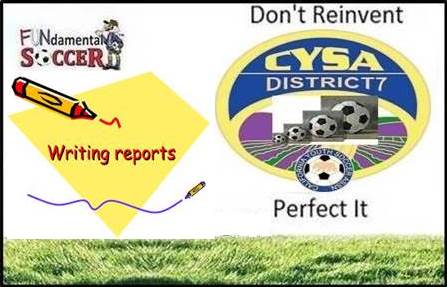
When necessary, writing reports after the conclusion of a match is part of an official’s requirements and duties. As the saying goes: “The job is not completed until the paperwork is done.“
Regarding a sendoff, a serious injury, or a player/game management issue, officials are expected to complete and file the appropriate reports promptly.
Reports should be concise, factual, and neat. The report’s recipients must receive a clear picture of what took place to help make an appropriate decision for the outcome.
common errors in report writing Include:
Information or details that are NOT pertinent to the situation. Suppose they are not directly related to the problem. In that case, they do not warrant a place in the report and should not be included.
Including “facts” which cannot or will not be verified. Stick to the facts and details that can be easily supported. Embellishing the situation will bring your credibility into question.

Using vague language when describing a situation. Vague language can be interpreted in different ways by different people. Using politically correct verbiage versus quoting exact words, expressions, or physical signs heard or witnessed during the match must be used in the report.
Use professional language. Use the language of the Laws, and do not try to justify your decision by adding unnecessary or unrelated information. Being professional and factual will lend credibility to your report.
Keep personal feelings or excuses out of the report. It is not the referee’s job to provide reasons for the culprit’s behavior nor excuses for unfounded accusations from the guilty party. Example: “The coach told me the player was having a bad day.” Just tell what happened and stay with the facts.
Do not make yourself the judge, the jury, or the executioner. It is not your place to include advice regarding the decision to be made. Just tell what happened and stay with the facts. The final decision rests with the individual or committee that reviews your report.

Sending the report. Before filing the report, have a crew member review it to ensure you are on the same page. In the event of a challenge, witnesses may be needed. Also, it is never a good idea to have a change of heart and, for whatever reason, intentionally overlook or discard a report. The word will get out, and the official will have some explaining to do. In case of an error on your part, it is best to follow up with an addendum.




